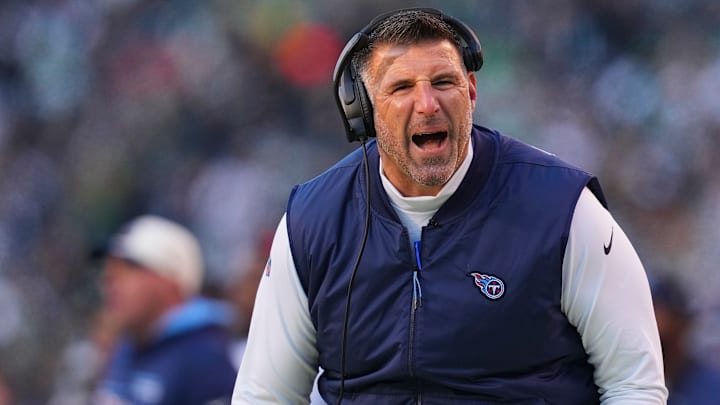The Tennessee Titans have gone out of their way to talk about their newfound appreciation for collaboration, but GM Ran Carthon has always explained that his job is to get players that fit what Mike Vrabel wants.
That is a good way to run a team, you don't want to draft players that don't fit your scheme or identity and force round pegs into square holes. With a full offseason's worth of examples, I think we can safely say that we know what Mike Vrabel wants his version of the Tennessee Titans to look like.
Whether you want to talk about a chip on the shoulder, an underdog mentality, grit, or whatever idiom you choose, the first thing that this team is going to be built around is the personality and mentality of the player. Carthon went out in free agency and brought in guys who have been told by other teams that they aren't good enough to start for them, like Andre Dillard, Azeez Al-Shaair, Daniel Brunskill, and Arden Key.
They did this at crucial points in the draft as well, but specifically when they drafted Will Levis.
Despite saying that they had a similar grade on Will Levis and Peter Skoronski, they passed on Will Levis at 11 for the great offensive line prospect. Since Levis was still available in the second round, the Tennessee Titans were thrilled to be able to trade up and draft him in the second round.
The Titans reportedly really hit it off with Levis in their interviews, so it wasn't the first time that Levis had been passed over by a team that he thought liked him. He started his career at Penn State before ultimately being benched when the team chose Sean Clifford to be their starter. After that, he transferred to Kentucky where he had an up-and-down career with the Wildcats.
Vrabel's own story started out with him spending four years with the Pittsburgh Steelers as a rotational pass rusher and a special teams player, so it isn't surprising to see that he prizes this mentality.
So that is the mindset that Mike Vrabel wants his Tennessee Titans to have, but what does he want to do with those players once they get on the field?
Hint: It isn't pass the ball.
Get ready for another Tennessee Titans offense defined by the running game
The other thing they want to do is run the ball...a lot. You can almost hear Mike Vrabel's voice when Carthon said that he wants this team to be built around running the ball because he doesn't want them to turn into the Golden State Warriors (the team that has won the NBA title four out of the last eight seasons):
Titans GM Ran Carthon on his philosophy for team building:
— Trevor Sikkema (@TampaBayTre) February 28, 2023
“It’s cute and sexy to play Golden State Warriors football in September and October when the weather is good, but the teams that play in January play tough defense and run the football” pic.twitter.com/cutGtyCh9W
They made sure to double down on that idea in the draft by adding two offensive linemen, a running back, a tight end that can block, and a quarterback that had more rushing attempts (133) in his first two years than passing attempts (102).
For better or worse, the wide receiver position is an afterthought to this team. Ran Carthon was insistent that the Tennessee Titans were just sticking to their board and their grades during the draft, and maybe that is true but it doesn't explain how they spent the last 5 months getting worse at receiver.
Aside from Treylon Burks who is promising and should be very good this season, the Tennessee Titans depth chart is Kyle Philips and then a list of players who wouldn't crack the game-day roster for the other 31 teams. There is no question that they have the worst receivers in the NFL, and the backup linebackers that they signed in free agency will have higher cap hits than players like D.J. Chark or Marvin Jones have this season.
The passing game just doesn't matter to Mike Vrabel, and that is fine because he has built a team based on running the ball and taking play-action shots. This is going to be an offense that will sink or swim based on their ability to run against defenses that know they want to run, and with the addition of Tyjae Spears, it doesn't matter whether Derrick Henry is there or not.
Vrabel seems to want a team that runs the ball and beats another team into submission on offense and one that stands up to smaller offenses on defense. Regardless of whether Will Levis or Ryan Tannehill is the quarterback, it really won't matter too much because the offense is built around passing the ball to make sure the running game is set up, and not the other way around.
It will be interesting to see how this strategy works for the Tennessee Titans. Clearly, Jon Robinson was holding Mike Vrabel back from fully leaning into this idea, hence why we have heard the word collaboration ad nauseam over the last few months. Now that Vrabel is being allowed to really sink his teeth into player acquisition he is loading up on the offensive line and the running game.
We are going to see just how well that idea works in a league where that thinking has largely been dismissed, but now we know that this is what Mike Vrabel wants to do and these are the players that he believes can do it.
